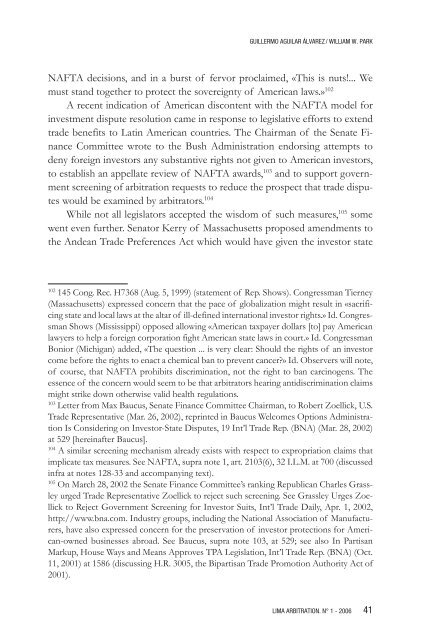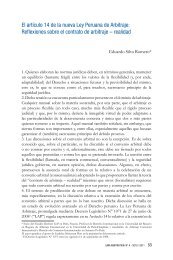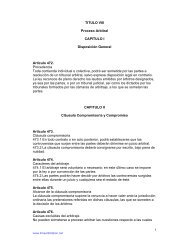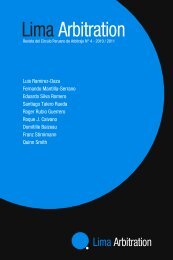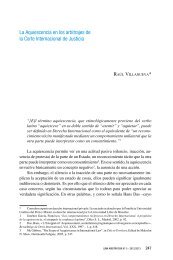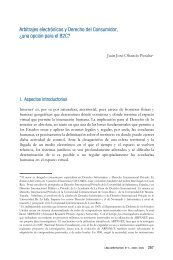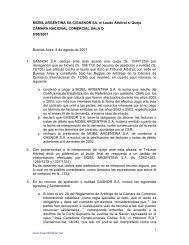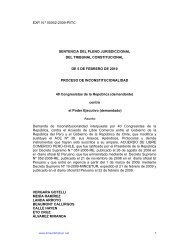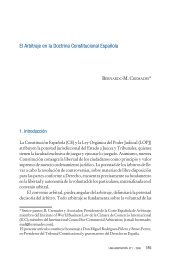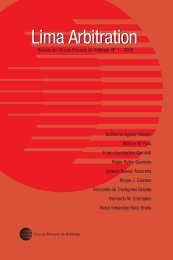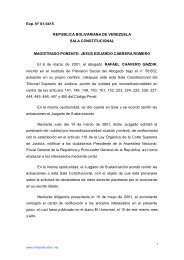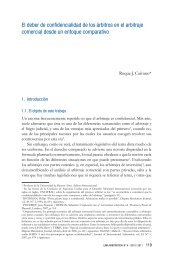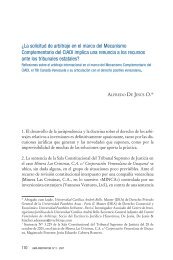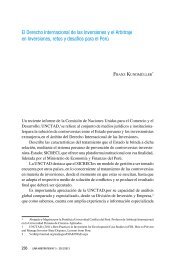Lima Arbitration
Lima Arbitration
Lima Arbitration
You also want an ePaper? Increase the reach of your titles
YUMPU automatically turns print PDFs into web optimized ePapers that Google loves.
GUILLERMO AGUILAR ÁLVAREZ / WILLIAM W. PARK<br />
NAFTA decisions, and in a burst of fervor proclaimed, «This is nuts!... We<br />
must stand together to protect the sovereignty of American laws.» 102<br />
A recent indication of American discontent with the NAFTA model for<br />
investment dispute resolution came in response to legislative efforts to extend<br />
trade benefits to Latin American countries. The Chairman of the Senate Finance<br />
Committee wrote to the Bush Administration endorsing attempts to<br />
deny foreign investors any substantive rights not given to American investors,<br />
to establish an appellate review of NAFTA awards, 103 and to support government<br />
screening of arbitration requests to reduce the prospect that trade disputes<br />
would be examined by arbitrators. 104<br />
While not all legislators accepted the wisdom of such measures, 105 some<br />
went even further. Senator Kerry of Massachusetts proposed amendments to<br />
the Andean Trade Preferences Act which would have given the investor state<br />
102<br />
145 Cong. Rec. H7368 (Aug. 5, 1999) (statement of Rep. Shows). Congressman Tierney<br />
(Massachusetts) expressed concern that the pace of globalization might result in «sacrificing<br />
state and local laws at the altar of ill-defined international investor rights.» Id. Congressman<br />
Shows (Mississippi) opposed allowing «American taxpayer dollars [to] pay American<br />
lawyers to help a foreign corporation fight American state laws in court.» Id. Congressman<br />
Bonior (Michigan) added, «The question ... is very clear: Should the rights of an investor<br />
come before the rights to enact a chemical ban to prevent cancer?» Id. Observers will note,<br />
of course, that NAFTA prohibits discrimination, not the right to ban carcinogens. The<br />
essence of the concern would seem to be that arbitrators hearing antidiscrimination claims<br />
might strike down otherwise valid health regulations.<br />
103<br />
Letter from Max Baucus, Senate Finance Committee Chairman, to Robert Zoellick, U.S.<br />
Trade Representative (Mar. 26, 2002), reprinted in Baucus Welcomes Options Administration<br />
Is Considering on Investor-State Disputes, 19 Int’l Trade Rep. (BNA) (Mar. 28, 2002)<br />
at 529 [hereinafter Baucus].<br />
104<br />
A similar screening mechanism already exists with respect to expropriation claims that<br />
implicate tax measures. See NAFTA, supra note 1, art. 2103(6), 32 I.L.M. at 700 (discussed<br />
infra at notes 128-33 and accompanying text).<br />
105<br />
On March 28, 2002 the Senate Finance Committee’s ranking Republican Charles Grassley<br />
urged Trade Representative Zoellick to reject such screening. See Grassley Urges Zoellick<br />
to Reject Government Screening for Investor Suits, Int’l Trade Daily, Apr. 1, 2002,<br />
http://www.bna.com. Industry groups, including the National Association of Manufacturers,<br />
have also expressed concern for the preservation of investor protections for American-owned<br />
businesses abroad. See Baucus, supra note 103, at 529; see also In Partisan<br />
Markup, House Ways and Means Approves TPA Legislation, Int’l Trade Rep. (BNA) (Oct.<br />
11, 2001) at 1586 (discussing H.R. 3005, the Bipartisan Trade Promotion Authority Act of<br />
2001).<br />
LIMA ARBITRATION. N° 1 - 2006 41


